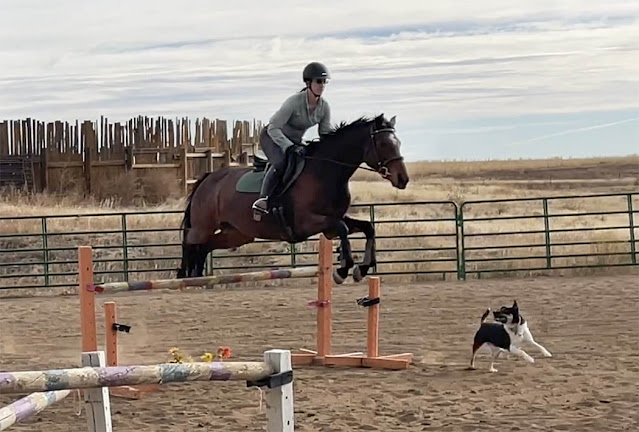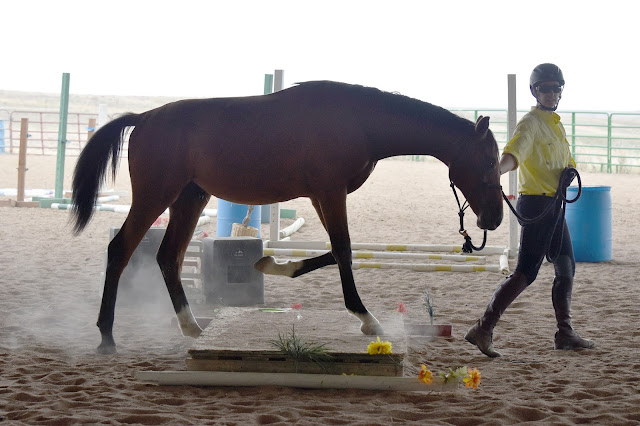This fall Raven hasn't been acting like herself. She had been stopping at fences, very hesitant to go round under saddle, and even occasionally been hard to catch in the paddock. All of these things are extremely unusual for her, as she generally chases other horses away from me so that she can go out to ride, is extremely confident over large fences, and moves like a dancer with springy round gaits.
When Dr. Landes came out to do fall vaccines and dentals he looked at her for me. I haven't noticed any lameness, but I was prepared to do radiographs and any and all diagnostics necessary to determine why Raven was behaving so oddly. We checked for lameness just in case with no findings. Next Dr. Landes checked her teeth, which had been floated in April, just six months ago. He found that her teeth were catching in a way that prohibited her from sliding her jaw forwards, as well as side to side. Once she was sedated and Dr. Landes got a closer look there was quite a bit going on in her mouth!
This first photo I found online (www.vivo.colostate.edu) that shows how the top teeth should meet the bottom teeth and grind against each other. The bone of the face is cut away so you can see how long the tooth roots are. There are two teeth missing from the top of the mouth, but you can get the idea of how they would normally meet.
This next photo (http://globalendurance.com/horse-training-2/teeth-and-hooves-2/) shows how the teeth meet, without the bone cut away to reveal the tooth roots.
Raven had significant ridges on her teeth, more so than is normal. She also had two molars farther back in her mouth, one on each side, that were erupting pointed at her tongue, instead of pointing at the opposing teeth. This created an odd wear pattern on those teeth, with one side of the tooth getting much longer than the other because it wasn't grinding against the opposing teeth evenly. At first glance it almost looked like the teeth had been fractured because they had such a stark "half worn, half not" appearance. This created the "catch" we were feeling when trying to slide her jaw, and prevented her from sliding her jaw when riding as well. Because it was such a dramatic issue, we assumed that her teeth were causing her problems.
This next photo from the same site (www.vivo.colostate.edu), labels the
different types of teeth in the horse's mouth. I drew in black lines
where Raven's molars had gone awry, and started pointing towards the
tongue instead of pointing straight up and down.
Trying to stretch her head forwards and down to go round under saddle was nearly impossible, so Raven braced when I asked for that. Jumping, especially large fences, requires the horse's head to really reach forwards, including the jaw sliding smoothly. Because she couldn't slide her jaw, she couldn't jump well, and began stopping at fences. Riding was likely uncomfortable, so she didn't want to be caught to go ride.
This is why everyone here gets their teeth checked at least every six months. When Raven was younger she had very normal dentition and only needed her teeth floated and rebalanced annually. Now that she is twelve, and because horse's teeth are continually erupting, we have discovered those two molars that are migrating in her mouth and causing issues which require more frequent assessment and dentals.
Dr. Landes sorted her out by filing the teeth into the appropriate angles and balance. Thankfully it does appear that Raven's teeth were the source of our problems, because she is riding quite well now. I'll definitely stay vigilant and aware of how she is behaving, and if she begins to have issues again I'll have her teeth checked right away rather than waiting until the next scheduled appointment.
Here is some video from Raven's ride today - very forward and eager to the fences with no stops or issues!






















































